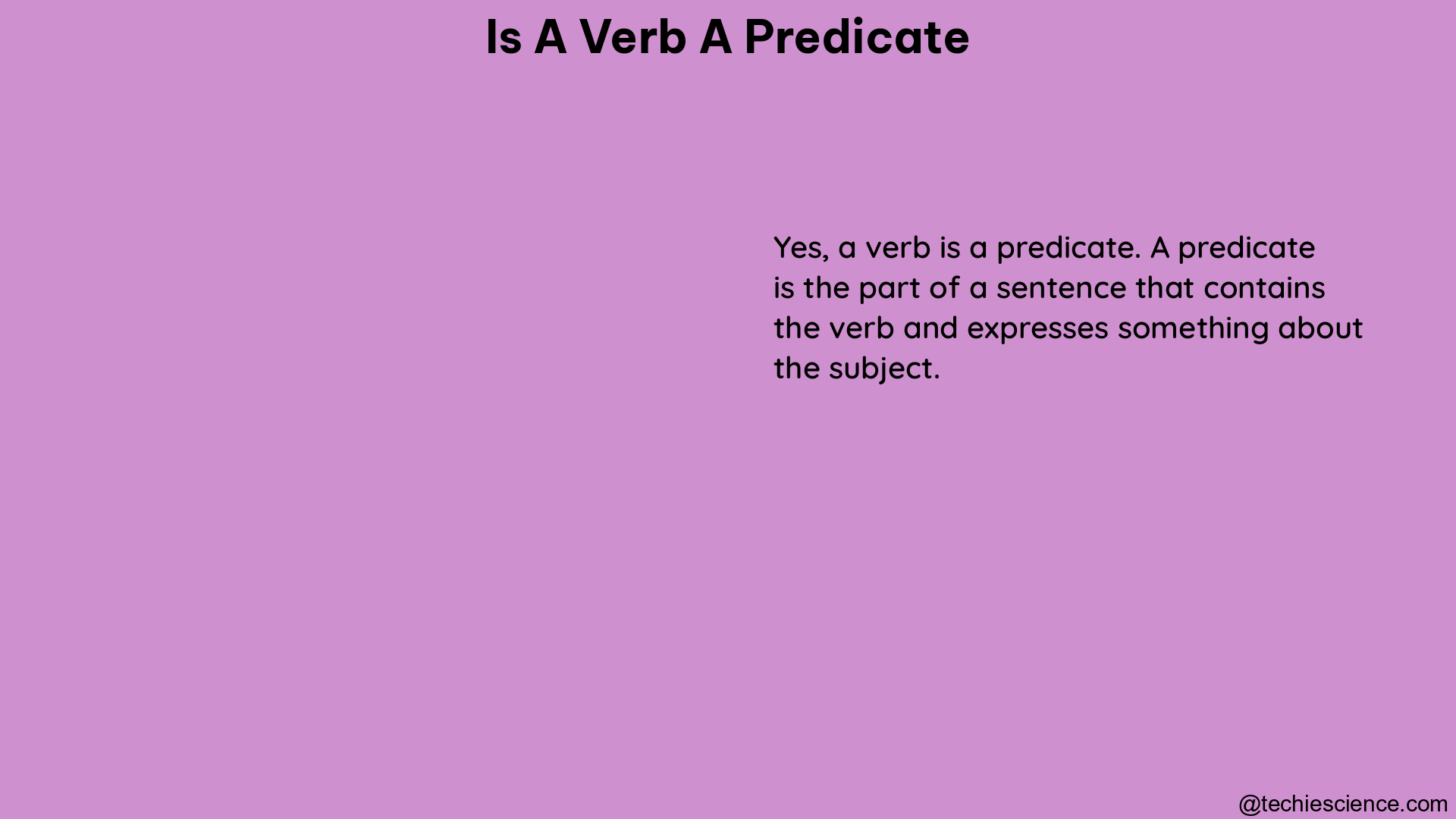A verb is a crucial component of a predicate, but not all verbs are predicates. Understanding the relationship between verbs and predicates is essential for mastering sentence structure in English grammar. In this comprehensive guide, we will delve into the details of predicates, their types, and how they interact with verbs.
What is a Predicate?
A predicate is the part of a sentence that describes the action or state of being of the subject. It typically includes a verb and may also include objects, complements, or adverbial modifiers. The predicate explains what the subject does or what is happening to the subject.
Predicates can be divided into two main types:
- Action Predicates: These describe an action performed by the subject, such as “The dog barked” or “The student wrote an essay.”
- State of Being Predicates: These describe a state or condition of the subject, such as “The flower is beautiful” or “The car was parked.”
Is a Verb a Predicate?

While a verb is a necessary component of a predicate, not all verbs are predicates. A predicate must include at least one verb, but it can also include other elements like objects, modifiers, and complements.
There are two main types of predicates:
- Simple Predicate: A simple predicate consists only of the main verb and any auxiliary verbs. For example, in the sentence “I ate,” the simple predicate is “ate.”
- Complete Predicate: A complete predicate includes all the words in a sentence that are not part of the subject. For example, in the sentence “I ate my lunch,” the complete predicate is “ate my lunch.”
It’s important to note that a verb can be part of a larger predicate structure, but not all verbs are predicates on their own.
Examples of Verbs and Predicates
Let’s look at some examples to better understand the relationship between verbs and predicates:
- Simple Predicate:
- Sentence: “The cat sleeps.”
- Verb: “sleeps”
-
Simple Predicate: “sleeps”
-
Complete Predicate:
- Sentence: “The student wrote a report.”
- Verb: “wrote”
-
Complete Predicate: “wrote a report”
-
Compound Predicate:
- Sentence: “The athlete ran quickly and jumped high.”
- Verbs: “ran” and “jumped”
- Compound Predicate: “ran quickly and jumped high”
In the first example, the verb “sleeps” is the simple predicate. In the second example, the complete predicate “wrote a report” includes the verb “wrote” and the object “a report.” The third example demonstrates a compound predicate, where the sentence has two verbs (“ran” and “jumped”) that together form the complete predicate.
Identifying Predicates in Sentences
To identify the predicate in a sentence, follow these steps:
- Locate the subject of the sentence.
- Determine the verb or verbs in the sentence.
- Identify the words that describe the action or state of the subject.
- The predicate includes the verb(s) and any additional words that describe the subject.
Here are some examples:
| Sentence | Subject | Verb | Predicate |
|---|---|---|---|
| The dog barked loudly. | The dog | barked | barked loudly |
| The student is studying for the exam. | The student | is studying | is studying for the exam |
| The team won the championship game. | The team | won | won the championship game |
In the first example, the subject is “The dog,” the verb is “barked,” and the predicate is “barked loudly.” In the second example, the subject is “The student,” the verb is “is studying,” and the predicate is “is studying for the exam.” In the third example, the subject is “The team,” the verb is “won,” and the predicate is “won the championship game.”
Key Takeaways
- A predicate must contain at least one verb, but it can also include other elements like objects, modifiers, and complements.
- Verbs are a crucial component of predicates, but not all verbs are predicates on their own.
- Predicates can be classified as simple (only the main verb) or complete (including the verb and other elements).
- Identifying the predicate in a sentence involves locating the subject, determining the verb(s), and identifying the words that describe the action or state of the subject.
By understanding the relationship between verbs and predicates, you can effectively analyze and construct sentences in English, ensuring your writing is clear, concise, and grammatically correct.
References:
- Oregon State Guide to Grammar – What is a Predicate? (liberalarts.oregonstate.edu)
- Albert.io – Predicates: Definition, Examples, & Exercises (albert.io)
- Grammarly – What Is a Predicate, and How Does It Work? (grammarly.com)
Hi…I am Ipsita Ranjit. I have a Master’s degree in English Literature from Utkal University. My interests are reading classics and watching Asian films, which have helped me to look at things from different perspectives. I adore cats.
Let’s connect through LinkedIn: https://www.linkedin.com/mwlite/in/ipsita-ranjit-2b2503154